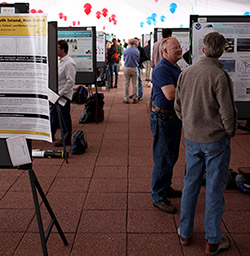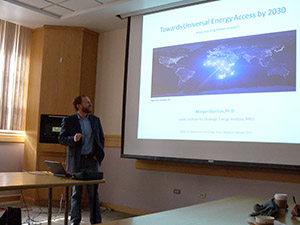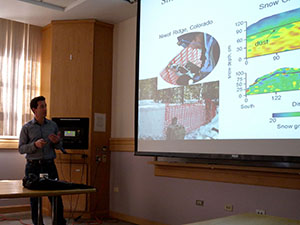Other CSTPR Presentations
Center faculty and graduate students presented the following posters at the annual CIRES Rendezvous May 2:
- An Agent-Centered Risk and Decision-Analytic Approach to Climate Change Adaptation. Mary Huisenga, William Travis and Katherine Clifford
- Does hurricane risk contain societal factors? Jessica Weinkle
- The dynamics of vulnerability: Why adapting to climate variability may not always prepare us for climate change. Lisa Dilling, Meaghan Daly, Roberta Klein, Olga Wilhelmi (NCAR), William Travis
|
 CIRES Rendezvous Poster Session
CIRES Rendezvous Poster Session |
- Max Boykoff chaired a session on “Climate Governance” at the Tokyo Conference on Earth System Governance January 28-31.
- Max Boykoff was a discussant on a panel titled “Who Speaks for the Climate: Author Meets Critics” at the Association of American Geographers’ Annual Meeting, Los Angeles, CA, April 9.
- Lisa Dilling (with K. Andersson, A. Ravikumar, C. Brown, and M. Holmgren) gave a talk titled “Adaptation to climate-related hazards in Colorado, Wyoming and Utah: Explaining differences in local responses” at the American Meteorological Society Annual Meeting, Austin, TX, January 8.
- Lisa Dilling (with D. Fernandez, J. Milford, K. Kelsey, N. Barger, and J. Neff) presented a poster titled “Mapping decision zones for carbon management in the San Juan National Forest” at the 4th Annual North American Carbon Program All-Investigators Meeting, Albuquerque, NM, February 4-7.
|
- Roger Pielke, Jr. discussed “The Science and Politics of Climate Change” on the NPR radio program Ideastream November 29.
- Roger Pielke participated in a panel titled “What counts as good evidence for policy?” at London’s Institute of Physics February 4.
- Roger Pielke gave a talk at the STEPS Annual Symposium at the University of Sussex on “Promises and paradoxes of scientific authority” February 6. A video of the talk can be viewed here.
- Roger Pielke, Jr. gave a talk at the Colorado Rural Electric Association’s Annual Meeting on Climate Change February 11.
- William Travis gave an invited presentation on “Means vs. Extremes: Challenges in Adapting to a Changing Climate” at the 150th annual meeting of the National Academy of Sciences, Washington, DC, April 28.
|




